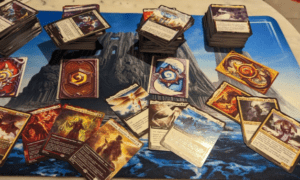Key Takeaway:
Generally, if a player in a Magic: The Gathering game gains control of a creature and the creature’s original owner then leaves the game (for example, due to losing), the creature is exiled. This is because any control effects end when the original owner leaves the game.
Detailed Explanation of Control Mechanics in Magic
In the complex and strategic world of printed Magic: The Gathering card game understanding the rules governing creature control and the consequences when a player leaves the game can be crucial to mastering gameplay. A common scenario involves the control of a creature being transferred between players through spells or abilities.
In Magic: The Gathering, when a player leaves the game (for example, if they die in a multiplayer game), any creatures or other objects they own leave the game as well. Additionally, any effects that gave that player control of any objects or players end. This includes situations where a player had gained control of a creature through spells or abilities. So, if you had taken control of a creature belonging to a player who then leaves the game, the control effect would end, and the creature would be exiled if it’s still controlled by the player who left the game. This applies regardless of how the control was gained, whether through exchange effects like Gilded Drake or direct control effects like Control Magic.
In simpler terms, if you had control of a creature through a mind control effect and the creature’s original owner leaves the game, the mind control effect ends, and the creature ceases to exist in the game.
This is based on rule 800.4a from the comprehensive rules of Magic: The Gathering, which details what happens when a player leaves the game.
Case Studies: Understanding Different Scenarios and Potential Outcomes
- Scenario 1: You control a creature, and an opponent uses a spell like “Control Magic” to take control of it. If they leave the game, control reverts to you as the default controller, assuming there are no other control effects.
- Scenario 2: If you used a temporary control effect (like “Act of Treason”) on a creature and then an opponent gains control of it before your effect ends, you won’t regain control if that opponent leaves the game. The control would have already reverted back to the creature’s original controller when your temporary control effect ended.
- Scenario 3: Consider a more complex situation involving multiple players and control effects. If a player uses “Bribery” to take a creature from another player’s library, they become the default controller. If you then gain control of it, and another player subsequently takes control before leaving the game, the creature’s control will attempt to revert to the default controller. If the default controller has already left the game, the creature is exiled.
To sum it up, creature control in MTG is a dynamic element that can drastically change based on the spells and abilities used in the game. Understanding the rules surrounding player departure and control effects is essential for strategic gameplay and can often be the difference between victory and defeat.































